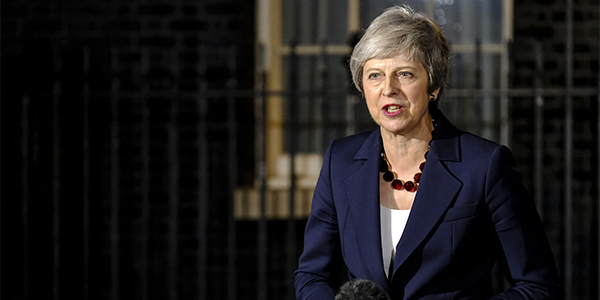Theresa May and the curse of the takeover Prime Minister
After a tumultuous week for Prime Minister Theresa May, who has survived a confidence vote of her parliamentary party but lost the support of a third of her MPs, Ben Worthy assesses her leadership in comparison to other Prime Ministers who succeeded to office through internal party procedures rather than at a general election.
 Theresa May. Picture: Number 10, via a CC BY-NC-ND 2.0 licence
Theresa May. Picture: Number 10, via a CC BY-NC-ND 2.0 licence
The curse of the ‘takeover’ Prime Minister has struck Theresa May. Most Prime Ministers who take over from another leader rather than win an election have short, unhappy times in office. To give you a flavour, here’s the list of post-war takeovers:
- Anthony Eden (1955–57)
- Harold Macmillan (1957–63)
- Alec Douglas-Home (1963–64)
- James Callaghan (1976–79)
- John Major (1990–97)
- Gordon Brown (2007–10)
- Theresa May (2016–?)
With probably one exception, this is not a list of successful or happy Prime Ministers. Most do badly in leadership rating polls. In fact, it looks pretty much like a list of failed leaders, with at least one name that should make you shout ‘who’?
As you can see, most of them didn’t spend long in Downing Street. If success is about staying put, then few of them did. Alec Douglas-Home (‘who’?) only managed 364 days. Most struggled to get past the three-year mark, with Macmillan and Major as exceptions.
Of course, judging what makes for a successful or failed leader is tricky. Assessments and reputations change over time. Four of them did do what Prime Ministers are supposed to do and actually went on to win a general election: Eden in 1955, Macmillan in 1959, Major in 1992 and May, of course, in 2017. But did winning do them any good? It didn’t bring Anthony Eden or John Major much comfort – and John Major bitterly regretted the narrowness of his win, which kept him trapped by a group of what Philip Hammond would call extremists. May’s ‘win’ in 2017 was probably the worst victory of all – a win that was very much a loss.
But the curse runs deeper than that. Only Harold Macmillan really stands out as a leader who went on to govern pretty successfully for six years, famously telling everyone they had never had it so good (unless you were an immigrant, in which case he passed a law limiting immigration because some Teddy Boys attacked some immigrants, which was an odd reaction).
One study of John Major spoke of how he became trapped in a ‘downward spiral’. In fact, this pattern fits most of the others, who hit similar spirals of the three Ps: problems, party and popularity. Problems seem to come in multitudes for takeover Prime Ministers. Of course, the very fact they had to assume power meant there was a problem. Most of the leaders either inherit a crisis, or walked quickly into the path of one. Callaghan hit the mid-1970s IMF crisis, Major faced Black Wednesday and Brown the banking crash. Even Macmillan had to manage the fallout from Suez. Many of them are remembered as crisis leaders trying, and often failing, to cope.
Their parties made things worse. Politically they often inherited divided or unhappy parties, sometimes after long-serving, powerful leaders who cast a long shadow. Major’s party was torn apart on Europe; Brown’s over Iraq. Recent takeovers illustrate Anthony King’s point that British politics is an ‘over the shoulder’ democracy, where leaders must watch their backbenchers behind them, not the ones opposite. Engulfed by crisis and splits, a leader’s popularity often plummets, with Major described as ‘so unpopular, if he became a funeral director people would stop dying’.
So, as things get worse, along comes a fourth P, plots. John Major faced a leadership election in 1995, after telling his party critics to ‘put up or shut up’. He won on paper but was even more undermined in practice: his not-quite-enough victory encouraged his enemies rather than shut them up – something May should note. Gordon Brown fought off at least three leadership plots but lost authority each time he did.
John Major describes candidly in his autobiography how this all felt, expressing his regret at how defensive he was:
‘I shall regret always that I rarely found my own authentic voice in politics. I was too conservative, too conventional. Too safe, too often. Too defensive. Too reactive. Later, too often on the back foot…. I made only a beginning and it was not enough.’ (Major 1999, xxi)
This appears to be exactly where May is now, seemingly trapped in a downward spiral. This is not to say she is the victim of events – she could easily have taken on the ERG and opted for telling the truth about what Brexit meant. May decided to pretend Brexit was do-able, and could be done in a way that suited everyone and kept the UK and her party together. Brexit isn’t very do-able and so far has kept no one together, triggering or worsening at my count four constitutional crises. All her victories seem to be Pyrrhic ones, from the general election to the December 2017 backstop and now her leadership election: wins that are just temporary retrieves. Her gender makes it all the more difficult – the media never focused on David Cameron crying.
Perhaps her only saving grace is Brexit. Brexit is the cause of her downfall but also protects her, in a curious way. Many MPs are wary of removing her and even more wary of who will replace her. It has also distracted from a host of other failures. I’d hope that in ‘normal’ times a government that sent British Windrush citizens to other countries, where 11 of them died before ever seeing their homes again, would resign in shame at its failure to care, failure to heed warnings and failure to help.
Not all takeovers share unhappy fates. David Lloyd George in 1916 and Winston Churchill in 1940 both took over during world wars and were and are fêted as ’great’. However, for all May tried to remind us of Churchill with her ‘finishing the job’ comment when faced with the vote of no confidence, it is another takeover premier she most resembles.
Most Prime Ministers want to be Winston Churchill and try to avoid being Neville Chamberlain. This is not to make a summer of 1940 point – we’ve had far too many of those already. Unfortunately for May, there are some eerie parallels with Chamberlain, who has become a byword for failure. Both were diligent and hard-working with a ‘narrow sharp edged efficiency’. They were also aloof, secretive, obstinate and given to narrow thinking, with an unwillingness to back down: happy, in Churchill’s phrase, ‘to strive continually in the teeth of facts’. She can only hope that she won’t have to repeat Chamberlain’s remarkable admission of failure in September 1939: ‘Everything that I have worked for, everything that I have hoped for, everything that I have believed in during my public life, has crashed into ruins’.
This post represents the views of the author and not those of Democratic Audit. See also the paper by Ben Worthy, (2016) ‘Ending in Failure? The Performance of ‘Takeover’ Prime Ministers 1916–2016’ available here.
About the author
 Ben Worthy is Lecturer in Politics at Birkbeck College, University of London. He is the author of The Politics of Freedom of Information: How and why governments pass laws that threaten their power.
Ben Worthy is Lecturer in Politics at Birkbeck College, University of London. He is the author of The Politics of Freedom of Information: How and why governments pass laws that threaten their power.





 Democratic Audit's core funding is provided by the Joseph Rowntree Charitable Trust. Additional funding is provided by the London School of Economics.
Democratic Audit's core funding is provided by the Joseph Rowntree Charitable Trust. Additional funding is provided by the London School of Economics.
[…] Originally on Democratic Audit here […]